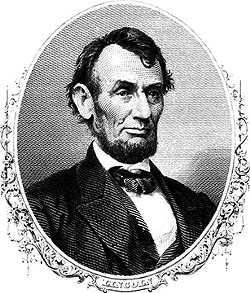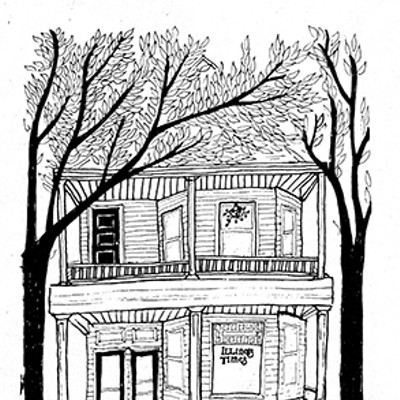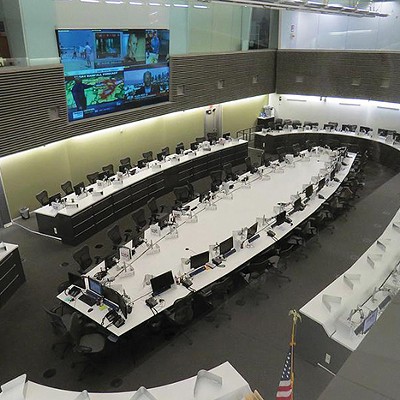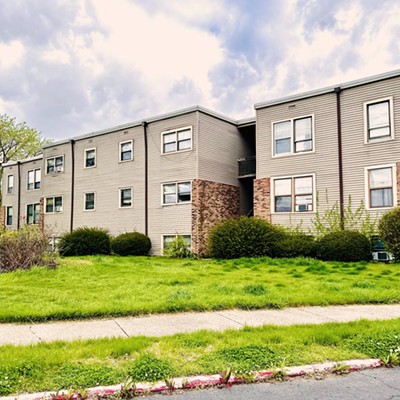As a portrait of Lincoln, this is not only overwrought but misleading. Lincoln was of the people and for the people – but never like the people. A son of toil, he nonetheless was no Jacksonian, as were so many of his neighbors of like class and background. Jacksonism took the yeoman farmer off his wagon and put him on a pedestal, but Lincoln wanted to stand higher than that. He had very early resolved to escape the hardships of pioneer agriculture. (As a young man he had a reputation as a lay-about, and he advocated early attempts to apply mechanical and scientific knowledge to lighten its drudgery.) Socially, Lincoln was popular with “the boys” but not because he shared their vices. He eschewed those popular frontier pastimes of gambling, smoking and drinking. Mr. Lincoln managed to be one of the boys without being exactly like the boys.
The first vote he cast in mid-Illinois, for the pro-Henry Clay candidate for Congress, put him at odds with the better part – or at least the larger part – of Springfield’s voting men. He supported a state bank, promoting higher taxes to maintain state bond payments, and strongly advocating support for canals and railroad construction, all with an eye toward building a modern commercial economy of the sort that most of his kin thought to be suspect as the basis for ordering a society.
It is easy to forget that by the time Lincoln was being talked about as a candidate for major office, he was an established attorney with a lucrative practice who lived the genteel life of the settled professional man. In a 2000 article, Allen C. Guelzo summarized how Lincoln changed during his years in mid-Illinois.
The bulk of Lincoln’s law practice, not to mention its most profitable aspects, had moved by 1856 into the state supreme court and the federal courts, and was devoted to the service of precisely those agents of the markets which were most lethal to rural and local communities: the railroad corporations, the banks and insurance companies of Sangamon, McLean and Morgan counties, and even at least one St. Louis venture capital firm.
Lincoln’s transformation was the fruit of a long-nurtured ambition. In the Jacksonville museum and archive of former mid-Illinois congressman Paul M. Findley is a mahogany sofa built for and used by Lincoln in his Springfield law offices. As Erika Nunamaker notes, it is of a style of the furniture we all know from his house, but he purchased this piece in 1837, when he had just moved to town on a borrowed horse with all his worldly belongings stuffed into two saddlebags. “Why, then,” she asks, “did the man . . . buy such a monumental, expensive, and elegant a piece of furniture?” We can reasonably assume that the sofa was a totem of the genteel life he had come to Springfield to lead.
Later, as an attorney, Lincoln was mentored by such members of the local professional and economic elite as James Matheny, Milton Hay, Evan Butler and James Conkling. As a politician, the Lincoln constituency included proportionately many more merchants and professionals than in the rest of the electorate, and fewer artisans and laborers.
By the time he was being talked about as a presidential prospect, Lincoln’s origins were forgotten by the larger public, if they were ever known. (The population turnover in mid-Illinois in those days was remarkably high; anyone living in the same town as long as five years qualified as rooted in the community.) Lincoln owed much to Springfield, but by then Springfield (or rather Sangamon County) did not feel it owed much to him. He was defeated when he ran for re-election to Congress. He might have out-argued Douglas in the great debates of 1858, but Douglas Democrats that year outvoted his supporters in both Springfield and Sangamon County, and in the 1860 and 1864 presidential polls Lincoln only barely carried Springfield while losing Sangamon County.
The common man in him that Lincoln had buried with hard work was dug up in 1860. His campaign managers realized, in the words of Bloomington’s Jesse Fell, that he needed to establish himself more strongly as “a man of popular origin” with whom the working people of the country would identify. Thus was the Rail-splitter born. Lincoln had striven his whole life to that point to overcome beginnings that he regarded as a cause for shame. For the rest of it, he would have to endure seeing them offered up as a cause for pride.
Contact James Krohe Jr. at [email protected].




















